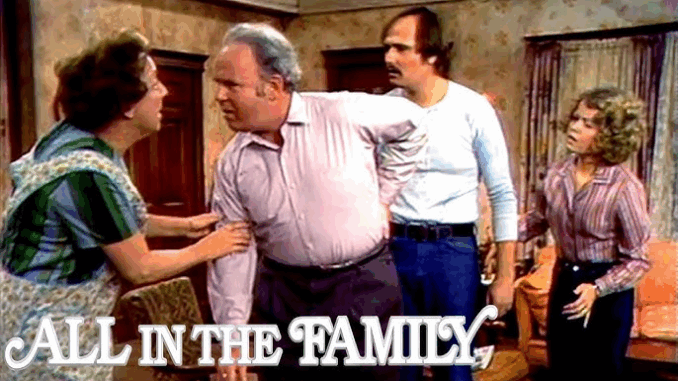
In a television landscape once dominated by idealized families and sanitized storylines, All in the Family arrived like a thunderclap. When it premiered on CBS in January 1971, few could have predicted the cultural earthquake that would follow. But over the next decade, the show transformed not only the sitcom genre, but also the way Americans talked about themselves — flaws and all.
The genius of All in the Family lay in its audacity. Where previous sitcoms avoided controversy, this one charged straight into it. Race, religion, gender roles, poverty, and politics weren’t just background noise — they were the story. Each episode confronted a new social issue, often through the blunt and unfiltered voice of Archie Bunker, a character as iconic as he was infuriating.
Archie wasn’t a hero — in fact, he was often wrong. But he was real. Played to perfection by Carroll O’Connor, Archie embodied a generation struggling to make sense of a rapidly changing world. Opposite him stood his liberal son-in-law Mike, a symbol of youthful rebellion and progressive ideals. Their dinner-table debates — sometimes humorous, often heated — mirrored the generational and ideological divides playing out in living rooms across America.
But All in the Family wasn’t just political commentary. It was also brilliant comedy. The writing was sharp, the timing impeccable, and the characters fully fleshed out. Jean Stapleton’s Edith provided emotional depth and unexpected strength, while Sally Struthers as Gloria brought complexity to the “daughter” archetype.
The impact of the series can’t be overstated. It redefined what a sitcom could be, proving that laughter and social critique weren’t mutually exclusive. Its influence is evident in shows like The Simpsons, Roseanne, The Office, and Black-ish — all of which owe a creative debt to the trail blazed by Norman Lear and his team.
Decades later, All in the Family continues to spark discussion. Reruns are watched with new eyes, some finding discomfort in the show’s language, others praising its honesty. But that tension is exactly why the show matters. It was never about easy answers — it was about starting the conversation.
In an age of echo chambers and cultural division, All in the Family reminds us of the power of storytelling that challenges, confronts, and above all, connects. It didn’t just entertain America — it made the nation look at itself, laugh, and think.
